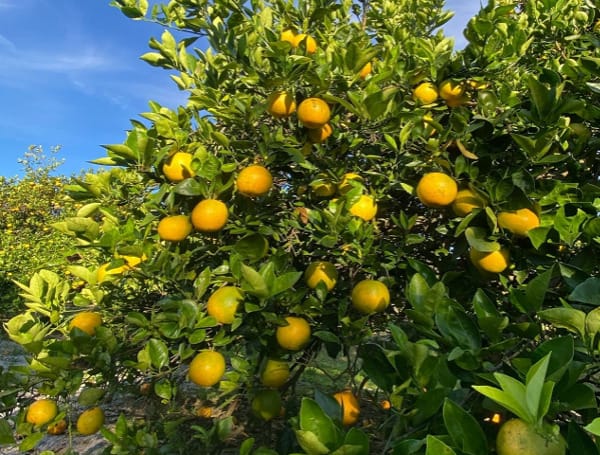U.S. Sen. Marco Rubio has warned that failure to update federal regulations for orange juice processing could mean the end of Florida’s already-shriveling citrus industry.
In a floor speech on Thursday, Rubio called on the Senate to move forward with his bill that would make a minute change in juicing regulations, but which, if adopted, would help preserve the industry.
Senate Democrats, in turn, blocked the bill, even though according to Rubio’s office at least five House Democrats from Florida are sponsoring a similar bill.
The Florida Republican said Senate Democrats have made Florida’s signature industry more reliant on foreign agriculture and may hasten the environmental demise of untold acres of rural lands.
As for their reasons, Washington state Democratic Sen. Patty Murray objected to Rubio’s measure, saying the bill would “overrule FDA experts.” She added that “skipping” that process does not “get to the root of the problem,” which appeared to be concerns about food safety.
At issue is an FDA regulation adopted roughly 60 years ago.
In the news: Teen ‘Ding Dong Ditch’ Prank Gets Out Of Control, Allegedly At Gunpoint
The agency determined that in order for orange juice to be considered “pasteurized,” at least 10.5 percent of the weight of the juice has to be comprised of soluble solids such as sugar that naturally occurs in the juice during processing.
Rubio called the number “arbitrary.”
“The 10.5 percent of the weight has nothing to do with the nutrition, has nothing to do with the safety, has nothing to do with the quality,” he said. “They had to come up with a number to define the difference between orange juice and something that’s not orange juice. And that was the number they came up with.”
“There’s no health benefit to doing that. In fact, you could probably argue that less sugar is probably better. You wouldn’t taste the difference, you wouldn’t know it. [If I] put two glasses of orange juice in front of you, one with 10 percent and the other one with 10.5, you wouldn’t notice the difference.”
“It’s not any less safe, it’s not any less nutritious. It just falls under that number,” he added.
For decades, the citrus industry had no problem meeting the threshold, Rubio noted.
But the devastation caused by nearly two decades of the citrus greening disease and Hurricane Irma in 2017, said Rubio, citrus producers have struggled to hit the FDA target. Consequently, they have been forced to use imported oranges, such as from Brazil, that have a higher sugar content.
Rubio argued that processing this change through the FDA’s bureaucracy would only cause more harm.
“These citrus growers sit on valuable land. Every developer in the state is trying to get their hands on that land. They’d love to develop it into a mall, into an industrial park. We’re facing those problems everywhere,” he said.
“Once you turn farmland into a commercial use, an industrial use, a housing development, you never get it back. I’ve seen farms turned into commercial development—I’ve never seen a commercial development be turned back to a farm.”
“Once we lose this land, we lose it forever. We lose it forever.”
The senator added that approving his bill would be good for food security as well as the environment since the citrus industry literally lives off of it.
With his bill, he said, the growers “will have some level of certainty that they’ll be able to continue in business.”
“It’s literally an undetectable difference, but it would make a big difference for citrus growers in Florida.”
“If we’re not going to be able to do it this way,,” Rubio concluded, “I hope we can get a hearing and we can get this passed, because I’m not sure if a couple of years from now we’re going to have a citrus industry. And if we lose them, we’ll lose that land and we’ll never get it back.”
Visit Tampafp.com for Politics, Tampa Area Local News, Sports, and National Headlines. Support journalism by clicking here to our GiveSendGo or sign up for our free newsletter by clicking here.
Android Users, Click Here To Download The Free Press App And Never Miss A Story. Follow Us On Facebook Here Or Twitter Here.
Copyright 2022 The Free Press, LLC, tampafp.com. All rights reserved. This material may not be published, broadcast, rewritten, or redistributed.

